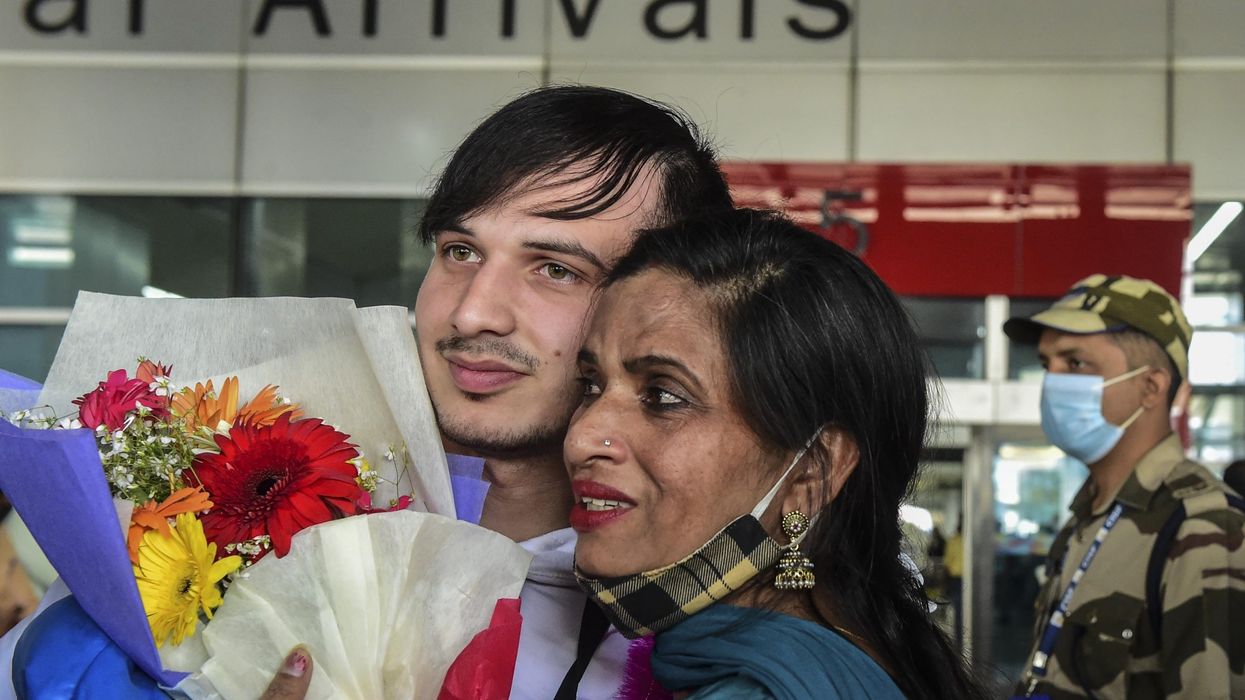EMOTIONS ran high as Indian students, evacuated from the embattled Ukrainian city of Sumy, came out of the Delhi airport on Friday (11) and hugged their waiting parents.
Some of the parents distributed sweets and garlanded their children while others welcomed them with bouquets and hugs as they arrived at the Indira Gandhi International airport.
Slogans hailing the motherland and prime minister Narendra Modi also rent the air.
An Air India flight from Poland's Rzeszow carrying 240 students landed in Delhi on Friday (11) morning.
Lalit Kumar travelled over 600 km from Chamba in Himachal Pradesh to reach the airport to receive his son Dheeraj Kumar, who was stuck in Sumy following the fierce Russian military offensive.
As soon as Dheeraj came out of the airport, his parents and sister hugged him and started crying. Dheeraj's father also distributed sweets to everyone present there and garlanded his son.
"I came all the way from Chamba and have been waiting here since midnight. But now since my son has returned safely, all my pain has gone," Kumar said.
Some students also thanked the government, the Indian embassy and their university who helped them get out of Ukraine.
"We thank the Indian government and the embassy which carried out this sensitive Operation Ganga to evacuate us from Ukraine. We also thank our university in Sumy which provided us food and water during the hardship," Lavish Kalal from Banswara in Rajasthan said.
Some states such as Chattisgarh and Gujarat have also set up their help desks for evacuees from Ukraine at the airport.
Tanvi Chaudhary, an evacuee and resident of Rudrapur in Uttarakhand, could not control herself and ran to hug her brother as soon as she saw him at the airport.
"I can't believe that I made it to my country and am now reunited with my family. It still feels like a dream," Chaudhary said as her eyes brimmed with tears.
For Ishita Pandita, the wait of over five hours was finally over as her brother Dhruv returned to India with other evacuees in another Indigo flight.
"The flight was delayed by around four hours and we had been waiting here since morning. My joy knows no bounds today and the wait is finally over as the flight has landed. My brother will finally be with us after a long wait," she said while taking out a garland and a bouquet from her bag.
The Indian government expressed its gratitude to Ukraine, Russia and the Red Cross for helping it evacuate its citizens from various Ukrainian cities.
External affairs minister S Jaishankar, in a post on Twitter, said the evacuation of Indian students from the northeastern city of Sumy was "particularly challenging".
"Operation Ganga, undertaken at the direction of Prime Minister Narendra Modi has delivered due to both leadership and commitment. We are thankful to all those who facilitated its objectives," Jaishankar said.
"Our particular gratitude to the authorities in Ukraine and Russia as well as the Red Cross for the evacuation assistance. Ukraine's neighbours - Romania, Hungary, Poland, Slovakia and Moldova gave us exceptional support. My sincerest thanks to them," he said.
India evacuated around 600 Indian nationals from conflict-ridden Sumy city after Russia and Ukraine provided a humanitarian corridor for their exit following New Delhi's intense diplomatic engagement with the two sides.
India has brought back around 18,000 Indians under 'Operation Ganga' which was launched on February 26, two days after Russia launched its military offensive on Ukraine.
"We are grateful to NGOs, individual volunteers, corporates, our airlines and the Indian Air Force who worked so tirelessly in this exercise," Jaishankar said.
(PTI)
Hugs and tears as families reunite with students evacuated from Sumy




